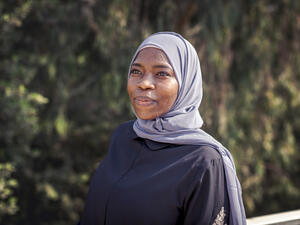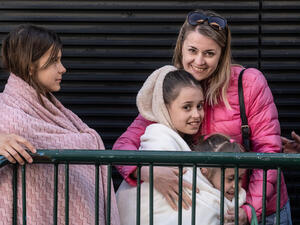Sissi's bequest helps refugee children 111 years after her murder
Sissi's bequest helps refugee children 111 years after her murder

Empress Elisabeth, popularly know as Sissi, in a portrait by the German painter, Franz Xaver Winterhalter.
BUDAPEST, Hungary, April 22 (UNHCR) - More than a century after her murder by an Italian anarchist in Geneva, the iconic Empress Elisabeth of Austria is helping refugee children study the performing arts in Hungary.
The 60-year-old Empress Elisabeth, more popularly known as Sissi, was stabbed in the heart by Luigi Lucheni as she waited for a ferry to take her to the lakeside town of Montreux on September 1898.
The great beauty, who was also Queen of Hungary, Croatia and Bohemia as spouse of Emperor Franz Joseph I, stipulated in her will that the proceeds from sales of her book, Das Poetische Tagebuch, should go to political dissenters in the Hapsburg-ruled Austro-Hungarian Empire.
The book, based on her diaries, was only published for the first time several decades after her death. It remains in print and is popular among historians and fans of Sissi, who continues to fascinate people around the world, but the proceeds are now used to help refugees.
The Austrian Academy of Science Press asked UNHCR to propose a worthy cause for the 8,000 euros raised from the latest edition. The refugee agency suggested that it go to refurbish an arts classroom in Budapest's Dob Utca School.
The primary school, which aptly lies in Budapest's Elisabeth Town district, was the first in Hungary to accept refugee students and it runs a special programme for them. More than half of the pupils are either migrants, refugees or from ethnic minorities. Dob Utca also offers special catering courses for vocational students.
When the new classroom is finished later this year, the school plans to develop a performing arts programme, offering theatre, ballet and music classes.
As a sort of thank you, the school plans to hold an annual "Sissi Day," which will include performances by the students based on stories from Sisi's life and death. The gift has also prompted the school to try and raise an extra 2,500 euros to buy a moveable stage for theatrical performances.
"Our children are very happy about this historic connection", said Eva Barna, headmistress of Dob Utca School. "Elisabeth was Queen of Hungary; she loved this country and to this day she is revered by Hungarians, young and old. We will name our new arts room after her."
By Melita H. Sunjic in Budapest, Hungary









